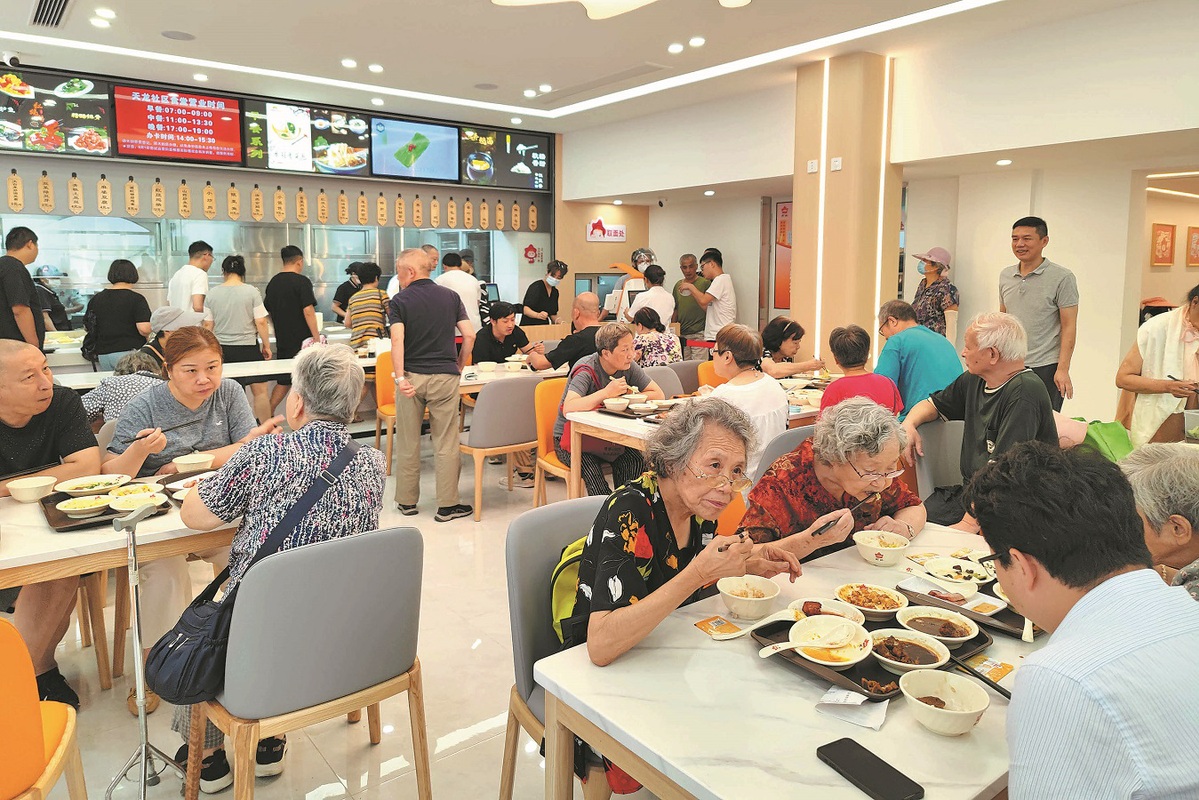Seniors find an appetite for community canteens
Meal assistance services meet dining requirements of the elderly


Policy support
An action plan to promote the development of meal services for the elderly was released in October by 11 departments, including the Ministry of Civil Affairs, the National Development and Reform Commission, and the Ministry of Finance.
The goal is to offer nutritious, affordable and accessible welfare meals for seniors, aimed at building a comprehensive and reasonable meal service network for the elderly that covers urban and rural areas.
The plan envisions that by the end of next year, provinces and regions that have implemented the policy of assisted meal services for the elderly throughout their jurisdiction will further extend services to urban and rural communities and make fresh progress in improving quality and efficiency. Provinces implementing the policy only in some areas should achieve breakthroughs in expanding services.
By the end of 2026, the coverage of assisted meal services for the elderly in urban and rural communities nationwide will be further improved, along with the service network, and a diversified supply network will be basically formed.
The plan advocates the development of inclusiveness and diversity, including the principles of government coordination and basic guarantees, tailored and targeted regional measures, and proactive use of market mechanisms. Enterprises and government-affiliated organizations are urged to take part in offering the service, and meal delivery services are also encouraged.
Back in the canteen at the Haijing community, Fan Ning was having lunch with her friends, Liu Changgang and his wife.
Liu, 70, voiced satisfaction with the canteen being near to their homes, appreciating the balanced taste, reasonable prices, and excellent service, which have resulted in the group visiting the establishment regularly.
"When we went to Shanghai, our relatives took us to a canteen for the elderly near their home, which made us very envious. Soon after I returned to Dalian, I found that a canteen had opened in my neighborhood. What a surprise," Liu said.
He added that he also admires the canteens for seniors in Shanghai and the discounts offered to different age groups.
To improve meal assistance services for the elderly, government departments throughout the country have introduced policies to provide different levels of subsidies for building canteens, along with covering dining expenses for the elderly based on local needs.
Data from Tianyancha, a leading corporate information provider in China, show that more than 11,000 community canteens are operating nationwide.
In Shanghai, the authorities have developed a meal assistance service system for the elderly, with community canteens or meal assistance points for seniors established near residential areas.
To address the financial strain on some meal assistance points, local authorities have launched an alliance of enterprises, including renowned catering companies, professional delivery organizations, and charitable enterprises, to ensure sustainability.
Some canteens are cooperating with takeout platforms in delivering meals to homes after the elderly order food on their phones. Subsidized dining coupons for seniors are also issued by certain canteens to offset dining costs.
In Hangzhou, Zhejiang province, a citywide smart meal assistance model has been launched. Since September 2022, residents who are 60 or older have enjoyed discounts at institutions recognizing the "City Pass".
Those in the 60 to 79 age group benefit from a 20 percent discount per meal, diners aged from 80 to 89 receive a 30 percent reduction, while those older than 90 are eligible for a 50 percent discount.
Writing in China Society News in November, Wu Yushao, a professor at the Fudan Institute on Aging and president of the China Association of Social Welfare and Senior Service, emphasized the need to effectively manage meal assistance services for the elderly, noting that nutrition deficiency among seniors often results from lifestyle habits.
He underscored the significance of such services in addressing cooking challenges, monotonous diets, and malnutrition among the elderly.
Wu also said many regions have integrated meal assistance services with other care services for the elderly. Existing facilities are used to create multifunctional activity spaces that provide dining, entertainment, healthcare, and leisure activities to promote greater social engagement among the elderly.























